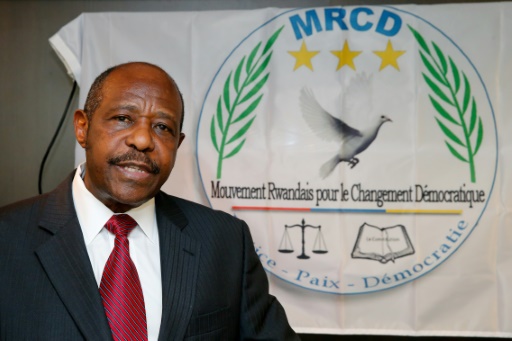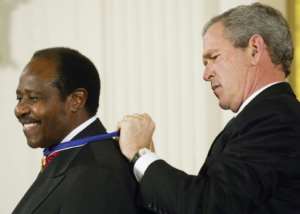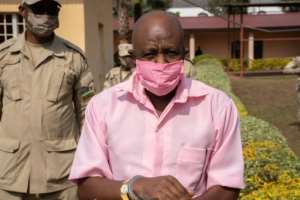
[ad_1]
The gentle-mannered hero of “Hotel Rwanda” credited with saving hundreds of lives during the 1994 genocide, Paul Rusesabagina became Kigali’s most bitter critic before being tried for terrorism.
The unassuming hotel manager in a hurrying suit became the world’s most famous Rwandan after the film’s release, but angered his government by using the Hollywood spotlight to campaign for political change in his tightly controlled homeland.
Outside the country, his journey from famous hero to sworn enemy of the government went almost unnoticed until August 2020, when Rusesabagina suddenly reappeared in Rwanda in handcuffs and a prisoner’s uniform.
Police said the 67-year-old was a mastermind terrorist accused of funding a rebel group responsible for a series of deadly attacks inside the East African country.
His family rejected the allegations, insisting that Rusesabagina was a political prisoner, whose character never strayed from the quietly courageous man portrayed by Don Cheadle in the Oscar-nominated blockbuster.
 Carine Kanimba: “Papa has always advocated for justice, peace and human rights. Now it is he whose rights are being violated ”. By JOHN THYS (AFP)
Carine Kanimba: “Papa has always advocated for justice, peace and human rights. Now it is he whose rights are being violated ”. By JOHN THYS (AFP) “Dad has always advocated for justice, peace and human rights. Now he is the one whose rights are being violated, ”said Rusesabagina’s niece and adopted daughter, Carine Kanimba.
‘Ordinary man’
Born in 1954 to farmers in central Rwanda, Rusesabagina briefly studied theology after school before working in a hotel and studying hospitality in Kenya and Switzerland.
Returning to Rwanda in 1984, he was hired as deputy general manager of the most prestigious hotel in Kigali at the time, the Hôtel des Mille Collines, a five-star establishment owned by Belgium.
In April 1994, when the genocide began, Rusesabagina was besieged inside the Thousand Hills with his family and hundreds of guests – mostly Tutsi like his wife, seeking refuge from crowds wielding machetes outside the gates of the hotel.
Rusesabagina, a moderate Hutu critical of the extremist regime, appeased the killers with beers and used his connections to trade for food as guests drank the pool water in desperation.
Late that night, he sent SOS calls to European governments and then to US President Bill Clinton using the hotel’s fax line.
American journalist Philip Gourevich, who met Rusesabagina while researching the genocide, described “a man of gentle manners, solidly built and rather ordinary in appearance.”
“This is how he seemed to see himself too, as an ordinary person who did nothing extraordinary by refusing to give in to the madness that surrounded him,” Gourevitch wrote in his 1998 book “We Wish inform you that tomorrow we will be killed with our families ”.
fiery critic
Rusesabagina returned to work but became disillusioned with the new Tutsi-dominated government that overthrew the Hutu regime and ended the 100-day massacre that claimed some 800,000 Rwandan lives.
He accused the Rwandan Patriotic Front (RPF), in particular its leader Paul Kagame, of authoritarianism and of promoting anti-Hutu sentiment as the new leaders violently consolidate their power after the genocide.
Rusesabagina left Rwanda in 1996 with other moderates who believed the space for political opposition was rapidly shrinking. He moved to Belgium with his wife and children and passed out in the dark.
 Rusesabagina received the Presidential Medal of Freedom from US President George W. Bush in 2005. By MANDEL NGAN (AFP)
Rusesabagina received the Presidential Medal of Freedom from US President George W. Bush in 2005. By MANDEL NGAN (AFP) But the 2004 release of “Hotel Rwanda” made Rusesabagina a celebrity overnight.
He received the US Presidential Medal of Freedom and traveled the world to warn of the evils of man.
Over time however, he increasingly used his new platform to thunder against President Kagame and the RPF in fiery tirades that alienated some allies and attracted powerful enemies.
He has come under relentless attack, with Kagame supporters shouting him out at speaking events all over the world.
The survivors of the Thousand Hills turned against him, accusing Rusesabagina of taking advantage of their misery and embellishing his exploits.
As the hunt intensified, Rusesabagina’s rhetoric turned darker, said Timothy Longman, who first met the hotelier in the mid-1990s.
“He was always a soft-spoken, fairly moderate person. What happened over time, of course, was that as he was attacked he was pushed into places. more extreme positions, ”said Longman, professor of political science and international relations in Boston. University.
Enemy of the State
Rusesabagina was closely linked to political opposition groups in exile.
But in a 2018 video, he pledged his support for the National Liberal Front, an armed group considered a terrorist organization by Rwanda.
“The time has come for us to use all possible means to bring about change in Rwanda, because all political means have been tried and failed,” he said.
Two years later, Rusesabagina boarded a plane he believed was bound for Burundi but landed in Rwanda instead.
 Rusesabagina arrives for a court hearing last September. By Simon Wohlfahrt (AFP)
Rusesabagina arrives for a court hearing last September. By Simon Wohlfahrt (AFP) He was arrested and tried as an enemy of the state.
Frail and bald, dressed in the pink uniform worn by Rwandan prisoners, Rusesabagina is now at the center of a global campaign led by his daughters Anaise and Carine, who are pushing for the release of their father.
Source link